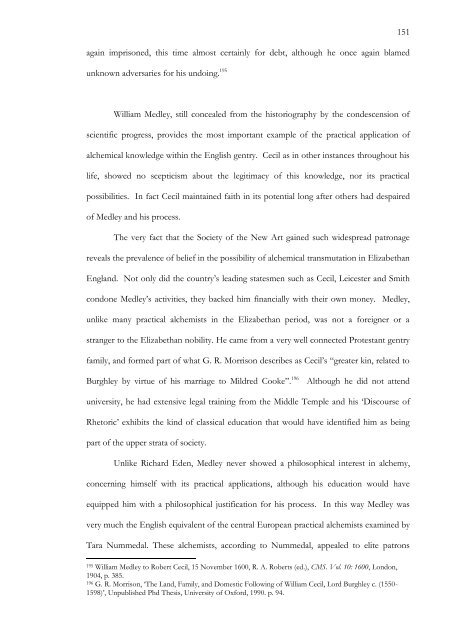The Alchemical Patronage of Sir William Cecil, Lord Burghley
The Alchemical Patronage of Sir William Cecil, Lord Burghley
The Alchemical Patronage of Sir William Cecil, Lord Burghley
Create successful ePaper yourself
Turn your PDF publications into a flip-book with our unique Google optimized e-Paper software.
again imprisoned, this time almost certainly for debt, although he once again blamed<br />
unknown adversaries for his undoing. 195<br />
<strong>William</strong> Medley, still concealed from the historiography by the condescension <strong>of</strong><br />
scientific progress, provides the most important example <strong>of</strong> the practical application <strong>of</strong><br />
alchemical knowledge within the English gentry. <strong>Cecil</strong> as in other instances throughout his<br />
life, showed no scepticism about the legitimacy <strong>of</strong> this knowledge, nor its practical<br />
possibilities. In fact <strong>Cecil</strong> maintained faith in its potential long after others had despaired<br />
<strong>of</strong> Medley and his process.<br />
<strong>The</strong> very fact that the Society <strong>of</strong> the New Art gained such widespread patronage<br />
reveals the prevalence <strong>of</strong> belief in the possibility <strong>of</strong> alchemical transmutation in Elizabethan<br />
England. Not only did the country‘s leading statesmen such as <strong>Cecil</strong>, Leicester and Smith<br />
condone Medley‘s activities, they backed him financially with their own money. Medley,<br />
unlike many practical alchemists in the Elizabethan period, was not a foreigner or a<br />
stranger to the Elizabethan nobility. He came from a very well connected Protestant gentry<br />
family, and formed part <strong>of</strong> what G. R. Morrison describes as <strong>Cecil</strong>‘s ―greater kin, related to<br />
<strong>Burghley</strong> by virtue <strong>of</strong> his marriage to Mildred Cooke‖. 196 Although he did not attend<br />
university, he had extensive legal training from the Middle Temple and his ‗Discourse <strong>of</strong><br />
Rhetoric‘ exhibits the kind <strong>of</strong> classical education that would have identified him as being<br />
part <strong>of</strong> the upper strata <strong>of</strong> society.<br />
Unlike Richard Eden, Medley never showed a philosophical interest in alchemy,<br />
concerning himself with its practical applications, although his education would have<br />
equipped him with a philosophical justification for his process. In this way Medley was<br />
very much the English equivalent <strong>of</strong> the central European practical alchemists examined by<br />
Tara Nummedal. <strong>The</strong>se alchemists, according to Nummedal, appealed to elite patrons<br />
195 <strong>William</strong> Medley to Robert <strong>Cecil</strong>, 15 November 1600, R. A. Roberts (ed.), CMS. Vol. 10: 1600, London,<br />
1904, p. 385.<br />
196 G. R. Morrison, ‗<strong>The</strong> Land, Family, and Domestic Following <strong>of</strong> <strong>William</strong> <strong>Cecil</strong>, <strong>Lord</strong> <strong>Burghley</strong> c. (1550-<br />
1598)‘, Unpublished Phd <strong>The</strong>sis, University <strong>of</strong> Oxford, 1990. p. 94.<br />
151















